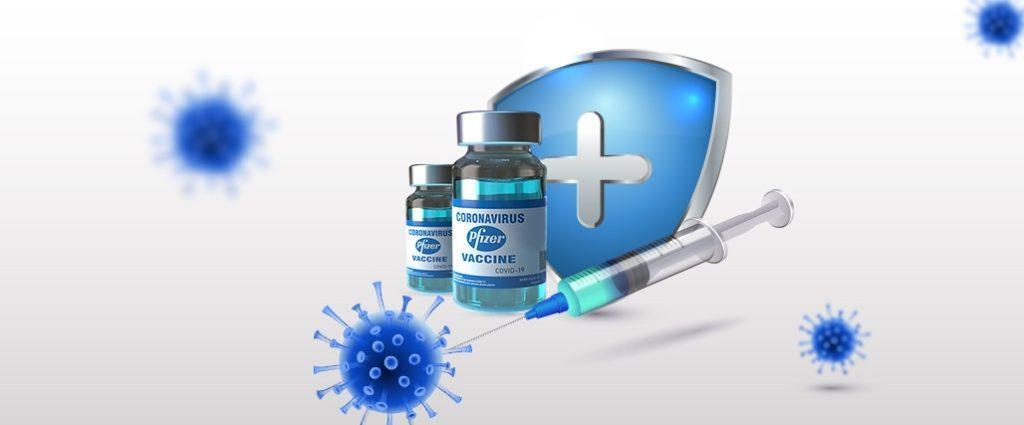On December 2, the agency announced that the U.K. Medicines and Healthcare Products Regulatory Agency (MHRA) granted emergency approval of Pfizer and BioNTech’s COVID-19 vaccine. This makes it the first vaccine outside of Russia and China to be approved for use. The company has developed the vaccine in collaboration with German biotech company BioNTech.
On December 10, the U.S. Food and Drug AdministrationTrusted Source will review Pfizer’s emergency use application. Latest by December 29, the agency that regulates drugs and vaccines in the European Union says it will review the company’s data. Two weeks after Pfizer and BioNTech announced that a final analysis of data from their late-stage COVID-19 vaccine trial suggests that the vaccine can prevent COVID-19 in people who haven’t been exposed to the virus before the U.K. development comes in.
As per research, it could be seen that the United States has seen at least 13.8 million confirmed COVID-19 cases and more than 272,000 related deaths. More than 1.4 million people have died from COVID-19 globally. In a news release, the company said that Pfizer tested the vaccine on more than 43,000 people with no serious safety concerns observed.
What’s on the cards in the third trial?
People were randomly assigned to receive two doses of the vaccine 28 days apart or an inactive placebo in the In the phase 3 trial. Additionally, participants were not aware of the group they were in. The company reported that the vaccine had an efficacy of 95 percent, seven days after the second dose. It is higher than an early analysis showing the effectiveness of better than 90 percent.
But you need to know the real-world effectiveness tends to be lower than the efficacy seen in clinical trials. The chair of pediatrics and an infectious disease specialist at Northwell Health’s Southside Hospital, Dr. Sunil Sood, said the results are promising. He also said it shows that the majority of the people who developed infection were placebo recipients, and most of those who got the real vaccine did not get infected.
On November 20, Pfizer submitted its application for emergency use authorization to the FDA. As the FDA recommends, by that point, researchers had followed at least half of the participants for an average of 2 months after their second dose. Its release company also said that it expects to produce up to 50 million doses of the vaccine in 2020 and up to 1.3 billion quantities in 2021.
Who will get the vaccine in the first phase?
As part of Phase 1 of the program from Tuesday, frontline healthcare staff, people over the age of 80, and care home workers will be among the first to get the vaccine as part of Phase 1. At least 50 National Health Service (NHS) hospitals are gearing up for what the U.K. government has described as the “biggest immunization program in history.” It is mainly because this weekend, the first doses of the Pfizer/BioNTech vaccine against Covid-19 arrived at “secure locations” in the country from neighboring Belgium.
The jab has been declared by the Medicines and Healthcare products Regulatory Agency (MHRA) had, which claims to offer up to 95 percent protection against Covid-19, is safe for human use against the novel coronavirus after “rigorous” checks. U.K. Health Secretary Matt Hancock said this coming week would be a historic moment as we begin vaccination against Covid-19.
He also said he government is doing everything it could to overcome “significant challenges” to ensure care home residents are vaccinated as soon as possible after they were also cleared for Phase 1 by the U.K.’s Joint Committee on Vaccination and Immunisation (JCVI), like those at the highest risk of death from the deadly virus.
Some questions with regard to the vaccine:
The results of Pfizer and BioNTech’s trial are very encouraging, said Dr. Carlos Malvestutto, an infectious disease expert at The Ohio State University Wexner Medical Center. He also said 90 percent protection is the level of protection that we would love to have for all vaccines. The efficacy is said to cross the 50 percent efficacy targetTrusted Source set by the FDA for COVID-19 vaccines.
In a news release, Pfizer released the results, not a peer-reviewed medical journal. Additionally, the final result is most likely to be based on 170 confirmed cases of symptomatic SARS-CoV-2 infection. As per the company’s statement, 162 of such cases were in people who received the placebo, while eight were in the vaccine group.
Among the study participants, ten cases of severe COVID-19 occurred, with nine in the placebo group and one in the vaccine group. Additionally, no extreme adverse events were observed among study participants who received the vaccine. Fatigue was the only side effect seen, which occurred in 3.8 percent of people after the first or second dose, and headache, which occurred in 2 percent of people after the double dose.
Several vaccines are needed to control the outburst of the Pandemic:
The first to show promising results in a phase 3 trial is Pfizer and BioNTech’s vaccine; 12 other vaccines have reached this stage. To elicit an immune response in people who receive the vaccine, the Pfizer vaccine uses messenger RNA or mRNA. On the other hand, Moderna’s vaccine is also based on this technology.
The technologies that are most likely to be used against the deadly virus include vaccines based on a DNA platform, weakened or inactivated versions of the virus, viral protein subunits, virus-like particles, or delivering a coronavirus protein using another virus. No doubt, some technologies are new while others have been used for years now.
Looking at the size of the Pandemic, multiple vaccines may be needed.
Key Takeaway:
At least 800,000 doses of the vaccine are expected to be available in the U.K. from next week. In all, the government has ordered a total of 40 million doses – enough to vaccinate 20 million people, with two shots each, 21 days apart.

